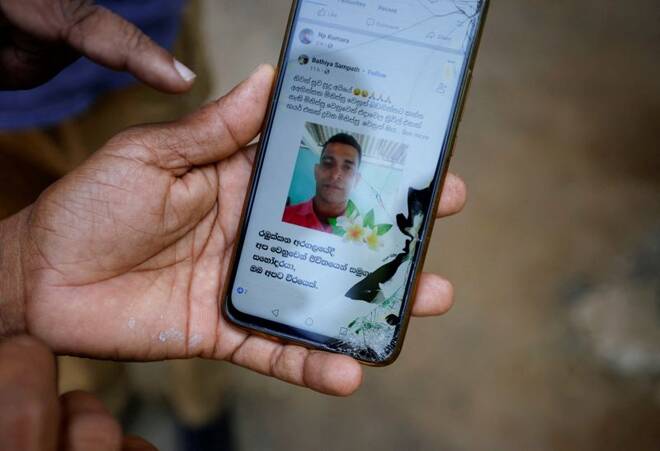Advertisement
Advertisement
A protest in a small Sri Lankan town that quickly turned deadly
By:
By Devjyot Ghoshal RAMBUKKANA, Sri Lanka (Reuters) - When K.D. Chaminda Lakshan was wheeled into the Kegalle Teaching Hospital in central Sri Lanka around 6 p.m. on Tuesday, the father of two was fighting for his life.
By Devjyot Ghoshal
RAMBUKKANA, Sri Lanka (Reuters) – When K.D. Chaminda Lakshan was wheeled into the Kegalle Teaching Hospital in central Sri Lanka around 6 p.m. on Tuesday, the father of two was fighting for his life.
Hours earlier, the 41-year-old had been waiting outside a filling station in the nearby town of Rambukkana, when people angered by long queues for petrol clashed with police.
Lakshan was likely hit by live ammunition, which police said they used to scatter the demonstrators, and died later on Tuesday, the hospital’s director Mihiri Priyangani told Reuters.
His was the first death during an unprecedented wave of unrest that has roiled Sri Lanka since last month, underlining the risk of more violence as the country faces its worst economic crisis since independence in 1948.
Thousands of people have taken to the streets in largely peaceful protests against President Gotabaya Rajapaksa’s government, angered by shortages of essentials like medicine and fuel, lengthy power cuts and spiralling inflation.
Tourism has been decimated by the COVID-19 pandemic and soaring oil prices after Russia invaded Ukraine have added to Sri Lanka’s financial woes.
In Rambukkana, a small town of low-rise buildings surrounded by forested hills in the centre of the country, residents recounted how some people had lined up at a fuel station overnight to get petrol, but on Tuesday morning there was none.
“The shortage is causing frustration,” said Kausala Desilva, 39, who runs a small restaurant near the station. “We weren’t informed about when supplies would come.”
The crisis is gnawing at middle-class households as well as poorer families, some of them already reeling from the pandemic.
Indika Priyantha Kumara, who runs a baking business, said that prices of eggs, butter, flour and sugar had gone up in recent weeks, and cooking gas had become scarce.
“Life has never been so difficult,” said Kumara, who had a large bandage on his forehead covering an injury he said he sustained during the protests. “We can’t live with these shortages.”
‘REASONABLE FORCE’
In separate statements on Wednesday, President Rajapaksa and his elder brother, Prime Minister Mahinda Rajapaksa, said that Sri Lankan police would carry out an impartial investigation into the incident at Rambukkana.
Police have said that their actions, including initially firing tear gas, were justified because protesters were attempting to set alight a fuel tanker that they had blocked at the railway crossing.
“According to the police officers who participated in the operation… they state that they used reasonable force according to the law,” police spokesman Ajith Rohana told reporters on Wednesday.
On Wednesday morning, Reuters reporters saw rocks, tear gas canisters and bullet cases strewn across the ground near the scene.
Locals in Rambukkana said the protest that blocked the crossing had gone on for several hours without any violence, until the police fired tear gas and the crowd retaliated.
“It was very peaceful,” said Kumara, “We didn’t damage anything.”
Video footage taken by a resident near the railway crossing seen by Reuters shows what he said were people arguing with a group of police at around 4:30 p.m. (1100 GMT) on Tuesday. Reuters could not independently verify the images.
By around 6 p.m., the Kegalle Teaching Hospital had started receiving casualties from Rambukkana, including Lakshan and three others with suspected gunshot wounds who are still in intensive care.
Priyangani, the medical director, said some had been wounded in the abdomen.
Outside their family home where dozens had gathered on Wednesday afternoon, Lakshan’s daughter quietly wept as she remembered her father, a small businessman.
“My father was a very good person who loved to help other people,” said Piumi Upekshika Lakshani, 19. “He never bothered or troubled anyone.”
(Additional reporting by Uditha Jayasinghe in Colombo; Editing by Mike Collett-White and Cynthia Osterman)
About the Author
Reuterscontributor
Reuters, the news and media division of Thomson Reuters, is the world’s largest international multimedia news provider reaching more than one billion people every day. Reuters provides trusted business, financial, national, and international news to professionals via Thomson Reuters desktops, the world's media organizations, and directly to consumers at Reuters.com and via Reuters TV. Learn more about Thomson Reuters products:
Advertisement
